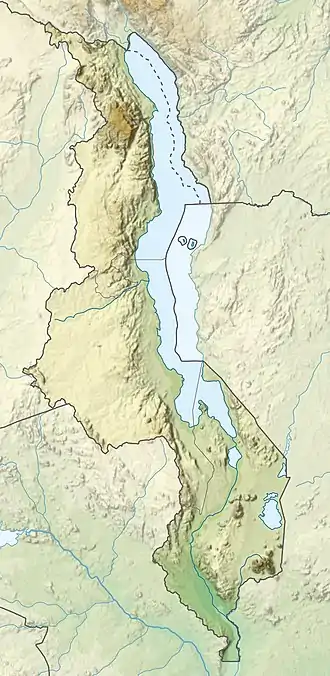| Dinosaur Beds | |
|---|---|
| Stratigraphic range: | |
| Type | Geological formation |
| Unit of | Lupata Group |
| Sub-units | Lower Member, Upper Member |
| Underlies | Unconformity with Pliocene Chiwondo Beds |
| Overlies | Precambrian metamorphic basement |
| Thickness | Upper member is 210 m (690 ft) thick in vicinity of CD-9 locality |
| Lithology | |
| Primary | Sandstone, siltstone, mudstone |
| Location | |
| Coordinates | 10°17′S 34°02′E / 10.28°S 34.04°E |
| Region | Northern Region |
| Country | |
| Extent | Karonga District |
 Dinosaur Beds (Malawi) | |
The Dinosaur Beds is a geological formation in Malawi whose strata date back to the Early Cretaceous. The age of the deposit is poorly constrained, but is likely to date from the Barremian to Aptian.[1] Dinosaurs, turtles and crocodylomorphs remains are among the fossils that have been recovered from the formation.[2] It is correlated with the Galula Formation in Tanzania. It consists of two members, a lower unfossiliferous member consisting of deep red stained sandstones, and an upper fossiliferous member consisting of white sands and grey to red mudstones and siltstones. The upper member is 210 m thick in the vicinity of the CD-9 locality.[3]
Vertebrate paleofauna
- Karongasaurus gittelmani - A lower mandible and a few teeth
- Malawisaurus dixeyi - "Skull elements, teeth, vertebrae, limb elements osteoderms, of several individuals."[4]
- Malawisuchus mwakasyungutiensis - A skeleton (almost complete articulated skeleton and skull)
- Platycheloides nyasae - A partial shell
- Anura indet.
- Theropoda indet.
Invertebrate fauna
- Hourcqia a non marine ostracod
See also
References
- ↑ Widlansky, Sarah J.; Clyde, William C.; O'Connor, Patrick M.; Roberts, Eric M.; Stevens, Nancy J. (March 2018). "Paleomagnetism of the Cretaceous Galula Formation and implications for vertebrate evolution". Journal of African Earth Sciences. 139: 403–420. doi:10.1016/j.jafrearsci.2017.11.029. ISSN 1464-343X.
- ↑ Weishampel, David B; et al. (2004). "Dinosaur distribution (Early Cretaceous, Africa)." In: Weishampel, David B.; Dodson, Peter; and Osmólska, Halszka (eds.): The Dinosauria, 2nd, Berkeley: University of California Press. Pp. 571-573. ISBN 0-520-24209-2.
- ↑ WINKLER, DALE A.; GOMANI, ELIZABETH M.; JACOBS, LOUIS L. (2000). "COMPARATIVE TAPHONOMY OF AN EARLY CRETACEOUS SAUROPOD QUARRY, MALAWI, AFRICA". Paleont. Soc. Korea Special Publication. 4: 99–114.
- ↑ "Table 13.1," in Weishampel, et al. (2004). Page 269.
This article is issued from Wikipedia. The text is licensed under Creative Commons - Attribution - Sharealike. Additional terms may apply for the media files.